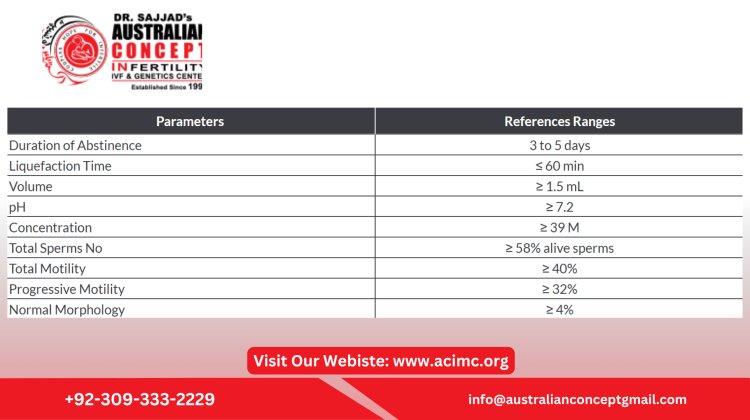What Factors Affect a Semen Analysis Normal Report
A semen analysis normal report can be influenced by various factors, including lifestyle choices, medical conditions, environmental exposures, and hormonal imbalances. Smoking, alcohol consumption, poor diet, obesity, and stress can negatively impact sperm quality. Medical conditions like varicocele, infections, and hormonal disorders also affect sperm count and motility. Exposure to heat, toxins, and radiation can lead to abnormal sperm production. Additionally, certain medications, recreational drugs, and age-related factors contribute to semen quality changes. To improve semen analysis results, adopting a healthy lifestyle, managing stress, and consulting an infertility specialist can be beneficial.

A semen analysis is a crucial test to evaluate male fertility by assessing sperm health. The results determine whether a man’s sperm parameters fall within the normal range or indicate potential fertility issues. However, several factors can influence a semen analysis normal report, affecting sperm count, motility, morphology, and overall quality.
1. Lifestyle and Dietary Habits
a) Smoking and Alcohol Consumption
- Smoking reduces sperm count and motility, increasing abnormal sperm morphology.
- Excessive alcohol consumption lowers testosterone levels, leading to decreased sperm production.
b) Diet and Nutrition
- A diet rich in antioxidants, vitamins, and minerals improves sperm quality.
- Deficiencies in zinc, folic acid, and vitamin C can negatively impact sperm health.
c) Obesity and Poor Physical Health
- Overweight men may experience hormonal imbalances that reduce sperm production.
- Regular exercise boosts testosterone levels and enhances overall reproductive health.
2. Medical Conditions and Hormonal Imbalances
a) Varicocele
- A condition where enlarged veins in the testicles affect sperm production and quality.
b) Infections
- Sexually transmitted infections (STIs) and prostate infections can harm sperm function.
- High white blood cell counts in semen indicate inflammation, reducing sperm motility.
c) Hormonal Disorders
- Low testosterone and high estrogen levels can disrupt sperm development.
- Conditions like hypogonadism and thyroid imbalances impact semen quality.
3. Environmental and Occupational Factors
a) Exposure to Heat
- Sperm production thrives at a cooler temperature than the body’s core.
- Frequent use of hot tubs, saunas, and tight clothing can decrease sperm count.
b) Chemical and Radiation Exposure
- Prolonged exposure to pesticides, heavy metals, and industrial toxins affects sperm health.
- Radiation treatments for cancer may lead to permanent sperm damage.
4. Medications and Drug Use
a) Prescription Medications
- Certain medications, including steroids, antidepressants, and chemotherapy drugs, reduce sperm production.
b) Recreational Drugs
- Marijuana, cocaine, and anabolic steroids lower sperm count and disrupt hormonal balance.
5. Stress and Mental Health
- Chronic stress increases cortisol levels, which negatively affects testosterone and sperm production.
- Anxiety and depression can reduce libido and overall reproductive health.
6. Frequency of Ejaculation
- Frequent ejaculation (daily) may temporarily lower sperm concentration.
- Infrequent ejaculation (long abstinence) can result in decreased sperm motility and quality.
7. Age and Genetic Factors
- Sperm quality declines with age, particularly after 40, affecting fertility.
- Genetic disorders such as Klinefelter syndrome can lead to poor sperm production.
How to Improve Semen Analysis Results?
To optimize sperm health and achieve a semen analysis normal report, consider the following:
✔️ Adopt a healthy diet with essential nutrients for sperm production.
✔️ Exercise regularly to maintain hormonal balance.
✔️ Avoid smoking, alcohol, and drug use that negatively impact sperm quality.
✔️ Manage stress through relaxation techniques and mental well-being.
✔️ Protect reproductive health by avoiding excessive heat and harmful chemicals.
✔️ Consult an infertility specialist if results are abnormal for further evaluation and treatment.
Conclusion:
A semen analysis normal report depends on multiple factors, including lifestyle choices, medical conditions, environmental exposures, and overall reproductive health. If your semen analysis results show abnormalities, taking proactive steps can help improve sperm quality and fertility potential. Consulting an infertility specialist in Lahore can provide guidance on personalized treatment options for better reproductive outcomes.
What's Your Reaction?
















